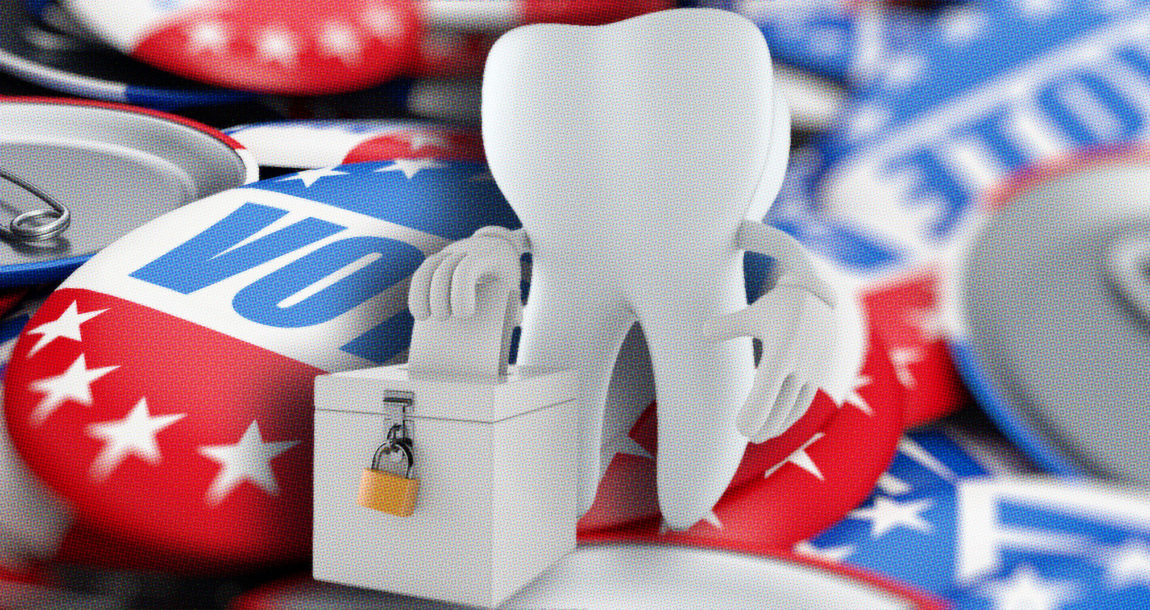Dental insurance reform landslide in Mass. spurs ADA to take the issue national

Emboldened by a landslide election victory in Massachusetts that reformed dental insurance, the American Dental Association plans to take the issue national.
Massachusetts became the first state in the nation to deliver consumer dental protections. By a margin of 71.4% to 28.6% voters approved the measure, which will require insurance companies to spend the bulk of their customers’ premiums - 83 cents of every dollar - on patient care. The remaining 17 cents would be available to insurers to spend on costs like employee salaries, fraud protection, customer hotlines and other services.
The term for the share of premium dollars that go toward patient care is known as the “medical loss ratio.” The law will also require greater financial disclosure. The Affordable Care Act set up a similar system for health insurers. Across the country, medical insurers must spend at least 80% of premiums on patient care or issue rebates to customers. In Massachusetts, health insurers must spend 85%-88% of premiums on patient care.
“What you've done here in Massachusetts has set the stage for the rest of the country," American Dental Association President George R. Shepley, told supporters on election night Nov. 8. "You all are just setting a shining example of where we can go in our future endeavors in dental insurance reform and what we can do to help our patients."
The ADA committed $5.5 million in support of the ballot question, with another $2.8 million coming from Massachusetts orthodontist, Mouhab Rizkallah, who authored and spearheaded the question.
Delta Dental was the main opponent to the ballot question, contributing more than $4.5 million of the roughly $5 million the opposition campaign committee raised through Sept. MetLife gave $650,000 earlier this month, on top of $220,000 in May. Other insurers included Altus Dental ($75,000), Principal Life Insurance ($250,000), and Sun Life Financial ($200,000). As with MetLife, Sun Life and Principal had given smaller amounts earlier in the year. MetLife gave $650,000 in September, on top of $220,000 in May.
Insurer opposition
The insurers argued that the law would spike dental insurance premiums and might even drive smaller providers out of the market.
"In a time when people are dealing with inflation and other issues, they will be hit with higher premiums," said a spokesman for the No On 2 campaign.
But voters were not persuaded by the avalanche of ads from opponents.
“The level of support shown by Massachusetts voters – who approved this at 71% – indicates how important it is,” said Chad Olsen, director of state government affairs at the ADA. “As evidence of the level of interest from dentists, we saw 49 state dental societies contribute to the ballot initiative campaign supporting "yes" on question 2. Dentists around the country know how important this reform is for the patients they serve.”
The ADA fully supports advancing medical loss ratio as an important dental insurance reform around the country, Olsen said, and the result of the election is a terrific springboard for a reform patients clearly want.”
The changes, however, won’t take effect in Massachusetts until Jan. 1, 2024, but Olsen said he expects similar measures to crop up in states across the country and be met with equal success.
Doug Bailey is a journalist and freelance writer who lives outside of Boston. He can be reached at [email protected].
© Entire contents copyright 2022 by InsuranceNewsNet.com Inc. All rights reserved. No part of this article may be reprinted without the expressed written consent from InsuranceNewsNet.com.
Doug Bailey is a journalist and freelance writer who lives outside of Boston. He can be reached at [email protected].





10 tips for successful prospecting in a hybrid world
NAIFA members meet with Congress
Advisor News
- Thrivent survey finds gap between financial fear and action
- Help your clients navigate tax regulations
- CFP Board announces CEO leadership transition
- State Street study looks at why AUM in model portfolios is increasing
- Supreme Court to look at ERISA rules in upcoming Cornell case
More Advisor NewsAnnuity News
Health/Employee Benefits News
- Illinois can fix the crisis in mental health care coverage
- Northwestern Medicine Reports Findings in Data Management (Technological Adjuncts to Streamline Patient Recruitment, Informed Consent, and Data Management Processes in Clinical Research: Observational Study): Information Technology – Data Management
- Trustmark Selects Leading Caregiver Platform Cariloop To Support Customers Facing Long-Term Care Challenges
- Tom Campbell: State Health Plan status quo not acceptable
- Enhanced ACA tax credits in the crosshairs in new Trump term
More Health/Employee Benefits NewsLife Insurance News
- Brighthouse Financial Announces Fourth Quarter and Full Year 2024 Results
- Jackson Recognized for Clear and Compelling Marketing and Communications throughout 2024
- NC yanks incentives for Charlotte-area firms that had pledged $200M investment, 900 jobs
- Symetra Adds New Consumer-Facing Cancer Care Compass (SM) Site During National Cancer Prevention Month
- Trustmark Selects Leading Caregiver Platform Cariloop To Support Customers Facing Long-Term Care Challenges
More Life Insurance News